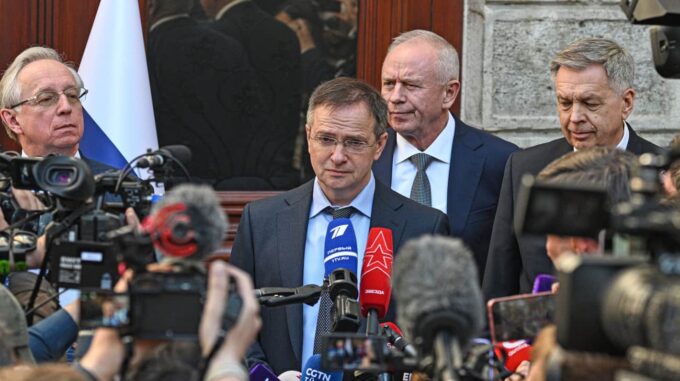A new round of diplomatic negotiations between Russia and Ukraine is once again being prepared in Istanbul; however, some details continue to raise concerns

According to official sources, the Russian delegation participating in this crucial stage of the diplomatic process will once again include a team that previously took part in earlier consultations and was critically assessed by the Ukrainian side. Specifically, Russia will again delegate Vladimir Medinsky — an aide to President Vladimir Putin, who previously led the Russian delegation and was heavily criticized by Ukrainian officials for the inadequate level of representation and insufficient constructive engagement during past negotiations. Maria Zakharova, spokesperson for the Russian Foreign Ministry, stated this information live on the "Russia 24" channel. She emphasized that the composition of the delegation will remain unchanged and that Vladimir Medinsky will continue to head it. This indicates Moscow’s intention to insist on its terms and to maintain contact in a "convenient mode," which is viewed ambiguous and concerning by Ukraine. In Ukraine, skepticism is expressed regarding this development, accompanied by calls for greater transparency and specificity. Representatives of the Ministry of Foreign Affairs noted that the composition of the Ukrainian delegation will depend on how and when the Russian side will prepare and submit an official "memorandum" regarding a ceasefire and other key conditions necessary to initiate constructive dialogue. Kyiv insists that without clear documents and mutual understanding of efforts, any negotiations will not yield real results. The scheduled date for the second round of negotiations is June 2 in Istanbul. Russia proposed this date and location, but Ukraine has not yet officially given comprehensive consent. Meanwhile, Kyiv urges Moscow to provide a written "memorandum" regarding the ceasefire conditions for review before the next round of talks, viewing this as a crucial step toward stabilizing the situation and creating a solid foundation for diplomatic efforts. The geopolitical situation remains tense and filled with important details: President Volodymyr Zelensky has already expressed dissatisfaction, noting that Russia has yet to submit an official "memorandum" to the United States, Ukraine, or Turkey. This has sparked criticism and concerns about Russia’s true intentions in this process. On the other hand, on May 28, Russian Foreign Minister Sergei Lavrov confirmed his proposal to hold the second round of talks on June 2 in Istanbul. It was also reported that Ukrainian Defense Minister Rustem Umerov had provided Moscow with a document reflecting Kyiv’s official position and outlining Ukraine’s expectations for Russia regarding the relevant "memorandum." This again underscores Ukraine’s desire for an open and transparent dialogue, while Russia has yet to give a formal response or guarantees in this regard. Observers highlight that the prospects for successful negotiations depend not only on diplomatic formalities but also on the willingness of both sides to compromise and create conditions for ending the conflict. Ukraine insists on concrete steps, particularly on a unilateral document on a ceasefire, to reduce tensions and establish a foundation for further constructive dialogue. Meanwhile, the political significance and role of individuals like Vladimir Medinsky continue to provoke discussion and complicate the process of reaching a genuine compromise. Thus, the upcoming negotiations scheduled for June 2 in Istanbul are expected to face many new challenges and uncertainties. Ukraine advocates for a more open and transparent dialogue, while Russia is again relying on former representatives and active use of diplomatic tools to promote its interests. Although the atmosphere remains tense, the outcome of these negotiations will largely determine the further course of the conflict and the path toward potential peace.

